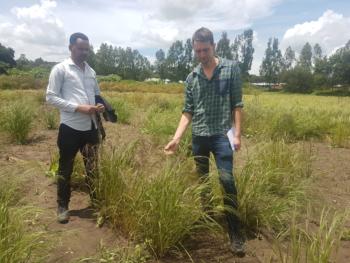Cambridge Global Challenges SRI, in collaboration with Cambridge Global Food Security IRC, delivered the Seed funding competition and interdisciplinary workshop on Nutrition challenges in developing countries that supported the three projects described below.
These ideas and projects were informed by the preseantations made by reserchers from Bahir Dar University (Ethiopia), the Nabakrushna Choudhury Centre for Development Studies (India) and Banaras Hindu University (India) on their ongoing work adressing specific malnutrition challenges in developing countries. Through an interactive exercise, participants formed small groups to develop proof of concept projects to address these challenges to apply for the seed-funding provided by the programme. Further details about the programme can be found here.
Farmer Participatory Soil Assessment for Improved Millet Nutrition in India
In India, specifically Odisha, the burden of malnutrition is extremely high as is the need to create sustainable livelihood systems. The projects aims to facilitate the optimum cultivation of millet as potentially a highly nutritional resource by ii) empowering local farmers to understand their basic soil resources and ii) translating UK soil assessment tool to a locally relevant instrument. The approach of farmer participatory soil assessment addresses both these issues: it uses non-technical metrics that are accessible to non-experts but accessible to those who understand the basic cultivation practices. We envisage that the indigenous agricultural community, including land owners, tenant farmers and labourers, would benefit from such an intervention. The proposed intervention would also be gender-inclusive.
Team:
Tackling zinc deficiencies in Ethiopia
The project objective is to understand the potential for increased zinc (Zn) content in teff grains to tackle zinc deficiency in Ethiopia. Our initial action will be to survey elemental concentrations of potentially genetically and phenotypically diverse lines adapted to Ethiopia by analyzing the flour sent to the UK from Dr. Assaye (Bahir Dar University).
This project will use the combined local expertise of Dr Hirut Assaye in Ethiopia, and our knowledge of Zn transport, fortification and crop breeding expertise in Cambridge, to obtain data on the variation in elements and anti nutritionals in the various lines of teff grown in Ethiopia. Genomic DNA from a high and low Zn content teff variety will be sent for next generation sequencing (GBS) to identify markers for breeding. Single Nucleotide Polymorphism (SNP) data will be produced by Genotyping By Sequencing (GBS) the contrasting phenotypic lines by mapping the reads from the two lines to the publically available teff genome. This will allow for rapid identification of markers for future breeding of other potential traits along with biofortification. This preliminary work will enable further work to develop markers to be applied in genetic association mapping populations to identify potential for Genome-Wide Association Studies. (GWAS) will be performed of a wider panel as part of future potential funding.
This data collected can then be used to create community resources for genetic analysis of increased elemental concentrations in the grains of teff.
The programme led by Cambridge Global Challenges and Cambridge Global Food Security that supported this project made me aware of the urgency to address food shortage and malnutrition across the globe especially in the developing countries.”
Nelzo Ereful, Plant Science Bioinformatics Researcher
Team:
- David Willer – Department of Zoology
- Chloe Orland – Department of Geography
- Nelzo Ereful – National Institute of Agricultural Botany
- Nick Fradgley – National Institute of Agricultural Botany
- Matthew Milner – National Institute of Agricultural Botany
Discovering the incentives to combat unhealthy diets
Team:
The Seed funding competition and interdisciplinary workshop on Nutrition challenges in developing countries was funded by the Isaac Newton Trust.






